Action
Authentic Traditional Souvenirs of Maldives

 Since the beginning of tourism in Maldives during the 1970’s the local crafts have gained a vast popularity among tourists. The various crafts and handiwork of Maldivian craftsmen have always intrigued travelers from all over the world. However over time the magnificent works of art has fallen victim to rising tides of cheap imitations and unauthentic replicates. While this may be due to the high production costs from traditional methods, when applied to large scale production, unauthentic products cannot even come close to the real ones in both beauty and uniqueness. Souvenir shops in the city and in islands usually trade both cheap imports and original local handicraft. For travelers it is vital to know that what they are paying for is authentic works of art.
Since the beginning of tourism in Maldives during the 1970’s the local crafts have gained a vast popularity among tourists. The various crafts and handiwork of Maldivian craftsmen have always intrigued travelers from all over the world. However over time the magnificent works of art has fallen victim to rising tides of cheap imitations and unauthentic replicates. While this may be due to the high production costs from traditional methods, when applied to large scale production, unauthentic products cannot even come close to the real ones in both beauty and uniqueness. Souvenir shops in the city and in islands usually trade both cheap imports and original local handicraft. For travelers it is vital to know that what they are paying for is authentic works of art.
Lacquer works

Also known as “Liye Laajehun”, Maldivian lacquer works are and always has been a magnificent art which has produced creative designs that have survived through the Maldivian history. Since ancient times, the techniques have been applied to create vases, jewelry boxes, and kitchen utensils of fabulous beauty, for the royals of Maldives.
It is a highly decorative art carried out by skilled artists in which lathes are used to paint layers of colored lac over shaped wood. Usually the artist starts with a bright color and ends with a dark color such as black. The artist then uses a sharp tipped object to carve designs exposing the bottom layers. A finishing polish is applied and the work is ready for use.
Dhoni crafts
 Dhonis or sail boats are a major invention of Maldivians as they were the first modes of transportation among Maldivians. They are designed to withstand the vigor of the oceans and to provide swift motion. Crafting of miniature models of these ancient works of art is known as Dhoni crafting.
Dhonis or sail boats are a major invention of Maldivians as they were the first modes of transportation among Maldivians. They are designed to withstand the vigor of the oceans and to provide swift motion. Crafting of miniature models of these ancient works of art is known as Dhoni crafting.
Such models of varying sizes and quality are available in Maldives. Maldivian artists use timber which is carved into models that represent the ancient vessels. The parts are polished and varnished before they are constructed into models.
Wood carvings
 Due to the remoteness and abundance of plants in Maldives, ancient natives used wood from the trees to create objects to optimize their work and fulfill their needs. Objects such as kitchen utensils and containers were carved from wood. The carvings are sometimes polished and can represent magnificent designs.
Due to the remoteness and abundance of plants in Maldives, ancient natives used wood from the trees to create objects to optimize their work and fulfill their needs. Objects such as kitchen utensils and containers were carved from wood. The carvings are sometimes polished and can represent magnificent designs.
Wood carving has evolved to create works of art such as miniature models that represent the early Maldivians and their culture. These wood carvings are sometimes painted and sometimes subjected to lacquer work. Carvings of images and text into wood was also carried out by early Maldivians. Traditional Maldivian mosques have large wooden planks with text carved into them.
Mat weavings
 Mats or “Kunaa” were vital to the early natives. They were mostly used for seating and sleeping among other uses. Mats have also been delivered as royal gifts by the Maldivian Sultans. The artistic designs created during the weaving are still comparable to modern textures. However the technique used is very simple and mostly it is just the creativity of the weaver that produces astonishing designs.
Mats or “Kunaa” were vital to the early natives. They were mostly used for seating and sleeping among other uses. Mats have also been delivered as royal gifts by the Maldivian Sultans. The artistic designs created during the weaving are still comparable to modern textures. However the technique used is very simple and mostly it is just the creativity of the weaver that produces astonishing designs.
Screw-pine leaves are collected and dried in the sun. Natural dyes are then used to dye them into three basic colors, black, brown and yellow. A simple loom and a knife are used to slit screw-pine leaves to produce the varying patterns on the mat.
Coconut shell products
 Coconut is one of the most abundant fruits in Maldives. It is one of those fruits that can be used during all stages of its maturation. In fact the coconut palm, one of the most abundant palm trees in Maldives, is the Maldivian national tree and has been used for multiple purposes throughout history.
Coconut is one of the most abundant fruits in Maldives. It is one of those fruits that can be used during all stages of its maturation. In fact the coconut palm, one of the most abundant palm trees in Maldives, is the Maldivian national tree and has been used for multiple purposes throughout history.
The trunks are used for timber while the husks are used to make coir ropes.The leaves are used for weaving mats and creating thatching for roofs. The eakles are used to create brooms. The shell is cleaned, dried, and polished, before it is used to create ornaments or other works of art. “Raa Bandhi” is a container created from two coconut shells joined to increase capacity. It is used to collect and store toddy from coconut palms.
Coir ropes
 Coir Ropes are an important part of Maldivian civilization, as they have multiple purposes. They were extremely important to early Maldivians during the building of huts and construction of sailing vessels and hammocks. Ancient Maldivians chose the coconut husks as it is a strong material as well as an easily available resource.
Coir Ropes are an important part of Maldivian civilization, as they have multiple purposes. They were extremely important to early Maldivians during the building of huts and construction of sailing vessels and hammocks. Ancient Maldivians chose the coconut husks as it is a strong material as well as an easily available resource.
The coconut husks are soaked for about two or three weeks by burying them in the beach. They are then pounded and beaten into fibers which are washed and sun dried. They are then hand rolled and woven into ropes of different sizes. The coir ropes or “Roanu” are now mainly used in ornamental purposes.
Action
Sun Siyam Olhuveli invests in staff wellbeing with upgraded sports facilities
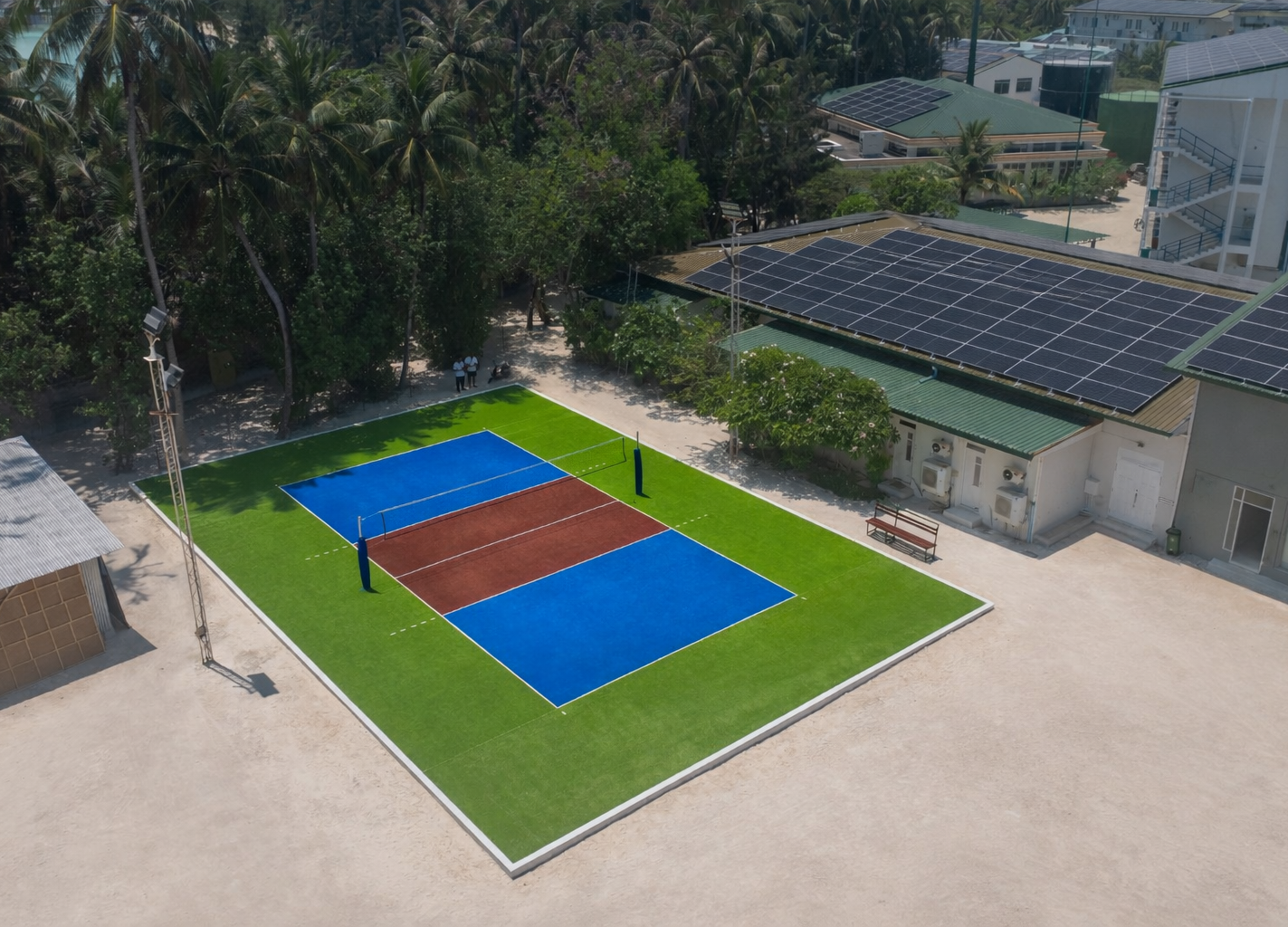
Sun Siyam Olhuveli has unveiled newly upgraded volleyball and futsal grounds for team members, reaffirming its commitment to employee wellbeing while advancing responsible, future-focused operations. The renovated volleyball grounds were officially inaugurated on 14 February, while the upgraded futsal ground opened earlier this year—together creating dedicated spaces for recreation, connection, and healthy competition across the island.
Designed to encourage regular physical activity and camaraderie beyond the workplace, the improved sports facilities represent a thoughtful investment in social infrastructure. They reflect a belief that wellbeing is fundamental to long-term performance, nurturing morale, teamwork, and a strong sense of belonging among team members.
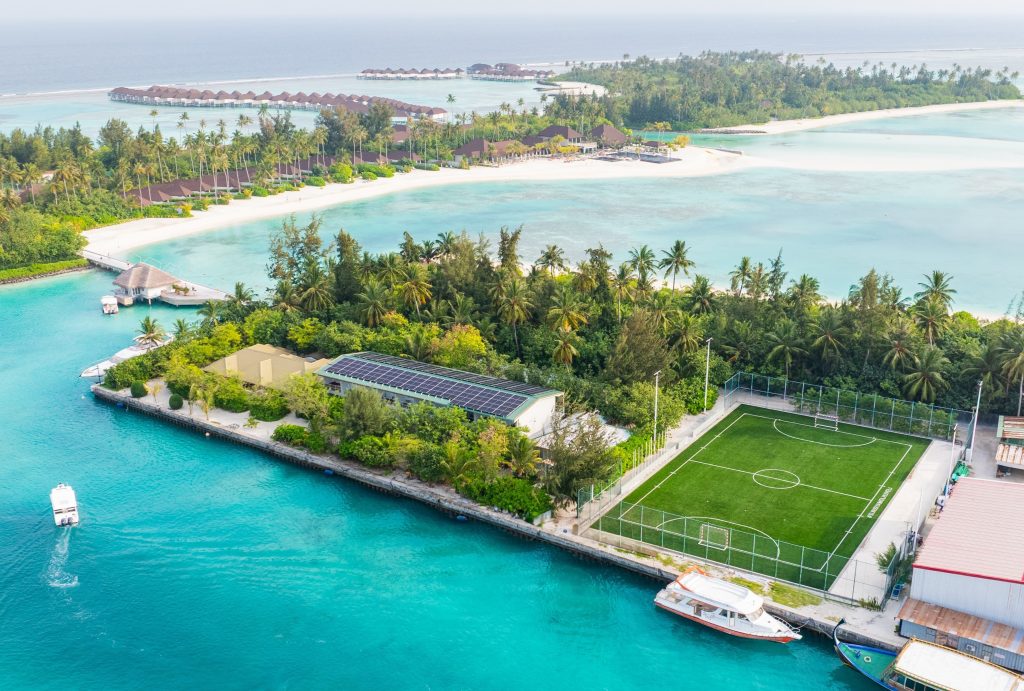
Alongside these developments, the resort has implemented NO BIN DAY every Tuesday, a practical initiative aimed at minimising food waste across operations. By encouraging mindful planning and responsible consumption, the initiative challenges teams to rethink habits around food—transforming sustainability into a shared, everyday discipline.
“Taking care of our people and the environment must go hand in hand. By investing in spaces that support our team’s wellbeing and introducing simple disciplines like NO BIN DAY, we are building a culture where responsibility is lived every day—naturally, collectively, and with purpose,” said Hassan Adil, General Manager of Sun Siyam Olhuveli.
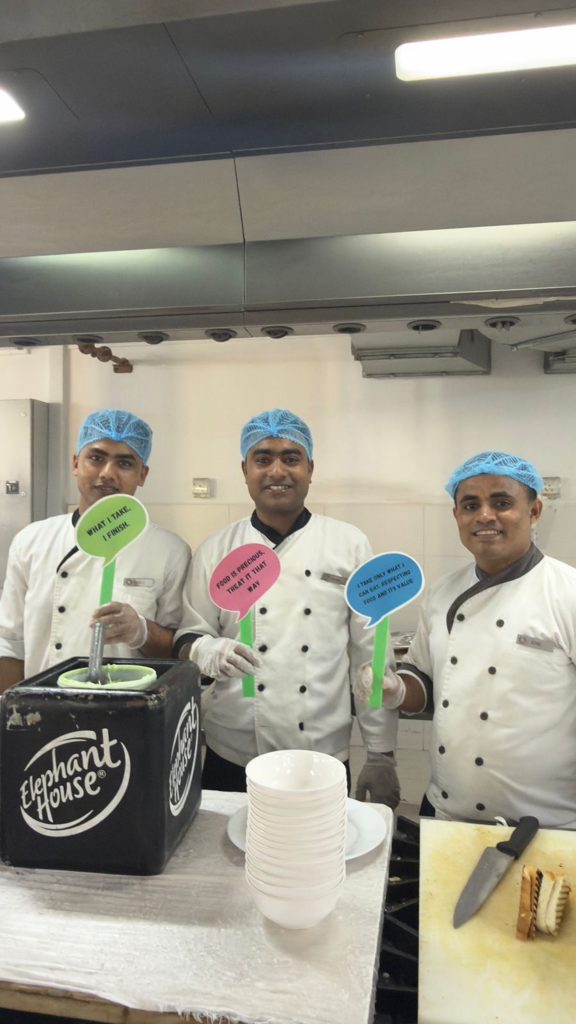
Both initiatives form part of Sun Siyam Care, the group’s corporate social responsibility platform, and align with the Social Infrastructure and Responsible Consumption and Production pillars under the GDS framework. Together, they reflect a people-first approach to sustainability—where everyday actions create lasting impact for teams, operations, and the wider community.
Sun Siyam Care is committed to creating a positive impact for people, communities, and the environment through responsible operations, social investment, and long-term sustainability actions across its destinations in the Maldives and Sri Lanka.
Guests are encouraged to learn more about these initiatives by visiting the Sun Siyam Care website at sunsiyam.com/sun-siyam-care.
Action
Sheraton Maldives Full Moon celebrates sixth anniversary of Reefscapers collaboration
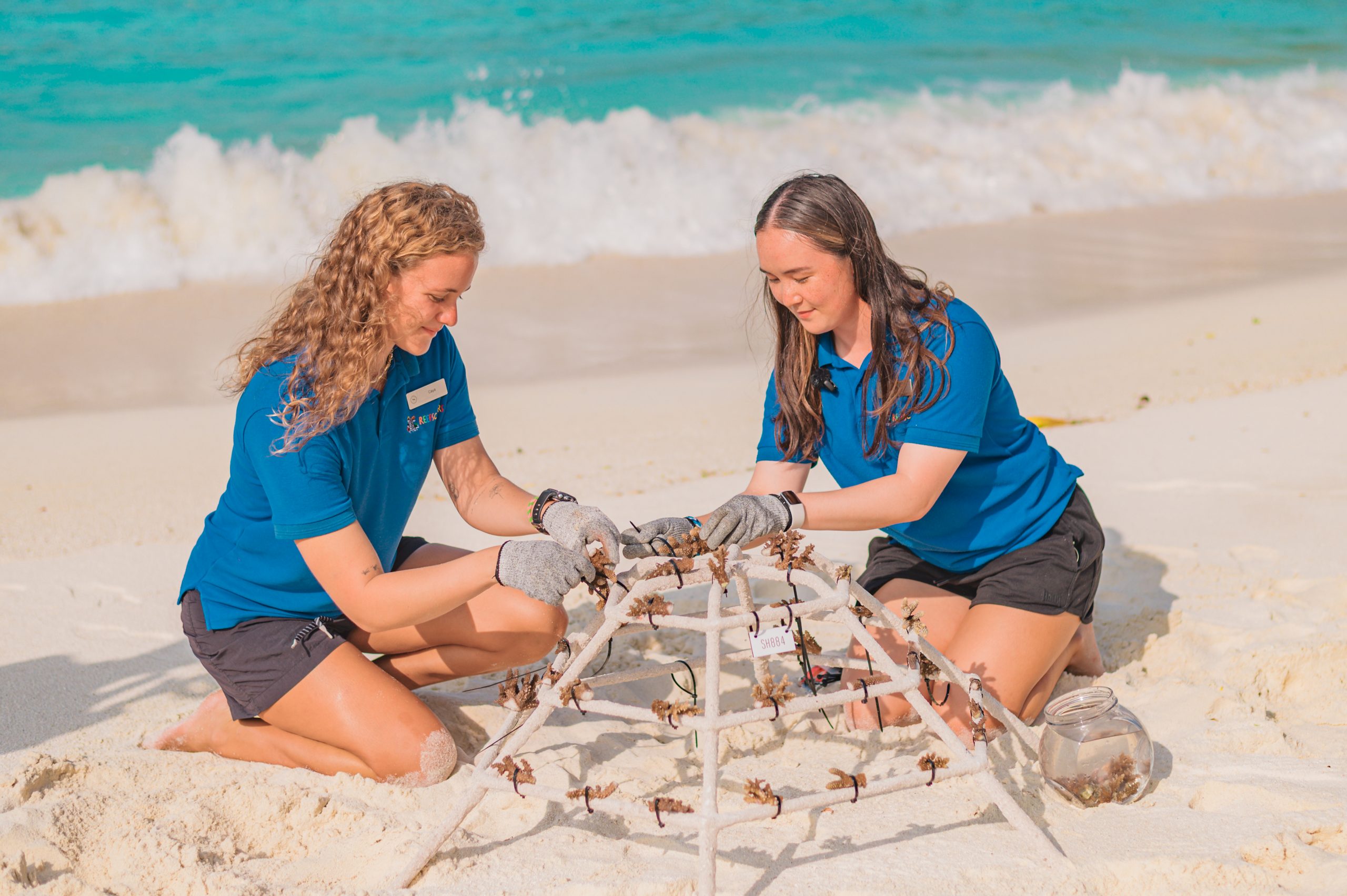
Sheraton Maldives Full Moon Resort & Spa marks the sixth anniversary of its partnership with Reefscapers on February 19, 2026, reaffirming its commitment to protecting and restoring the Maldives’ fragile reef ecosystems. Since launching the partnership in 2020, the resort and Reefscapers have worked together to restore coral habitats, support marine biodiversity, and engage guests in meaningful conservation experiences. The milestone also marks one year since the successful relocation of approximately five tons of coral to the resort’s house reefs — one of the partnership’s most significant conservation initiatives.
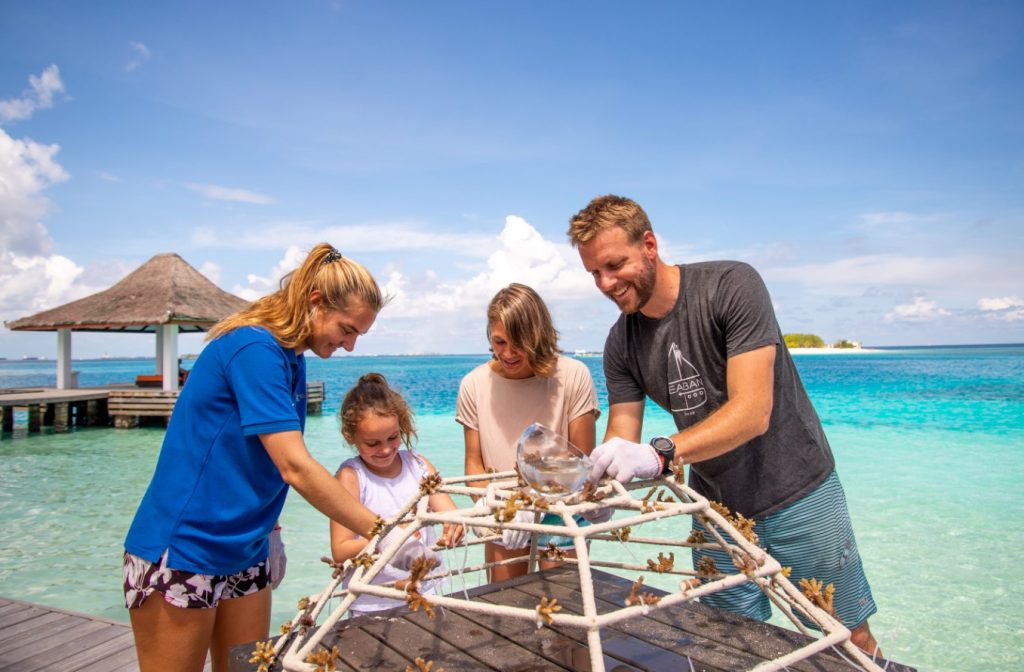
Over the past six years, the partnership has become a defining pillar of the resort’s sustainability journey, blending scientific restoration with purposeful guest engagement. To date, the initiative has resulted in the planting of 898 coral frames, supporting approximately 33,000 coral colonies now growing across the restoration sites. Through coral propagation, reef monitoring, and awareness programmes, these efforts continue to regenerate reef structures while deepening understanding of the essential role coral ecosystems play in sustaining marine life and protecting coastlines. Each thriving coral frame reflects a shared dedication to preserving the natural wonders that make the Maldives one of the world’s most extraordinary marine destinations.
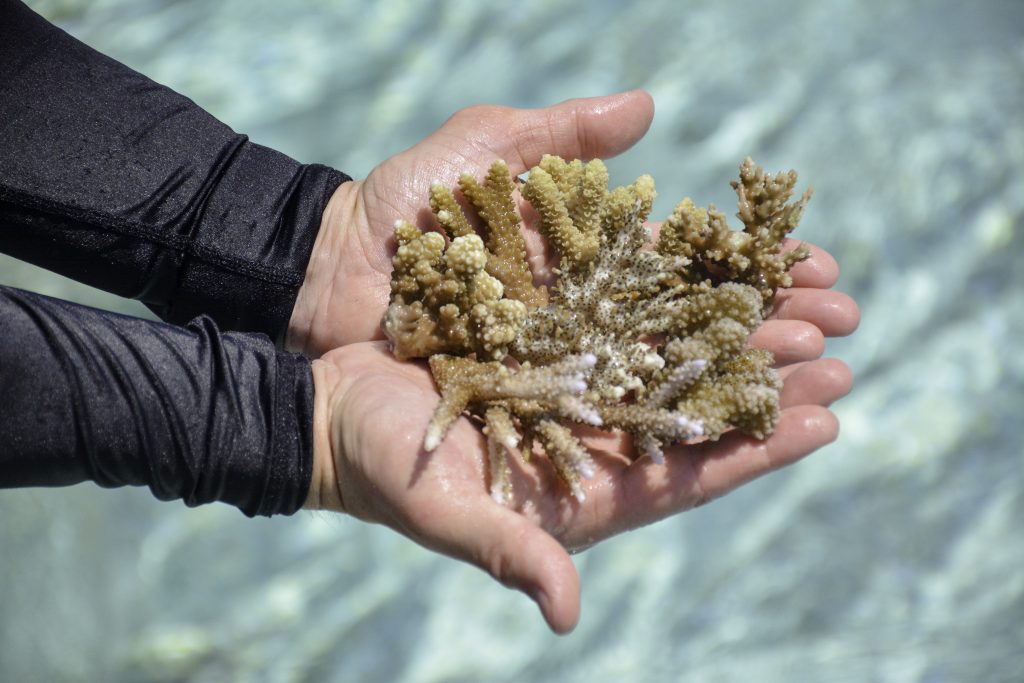
“What makes this partnership special is seeing how small, consistent actions turn into real change underwater. Watching the relocated corals settle, survive, and begin to grow over the past year has been incredibly rewarding for us and the guests who return and witness how they’ve helped restore a living reef,” shares Katelyn, the resort’s Marine Biologist.
A defining achievement of the collaboration has been the coral relocation project, which carefully transferred coral colonies from Ras Malé, also known as the Maldives Eco City, to the resort’s dedicated restoration site, safeguarding them from potential threats linked to land reclamation activities in the Fushi Dhiggaru Lagoon. One year on, these corals continue to flourish beneath the surface, strengthening reef resilience and contributing to the long-term health of the surrounding ecosystem.
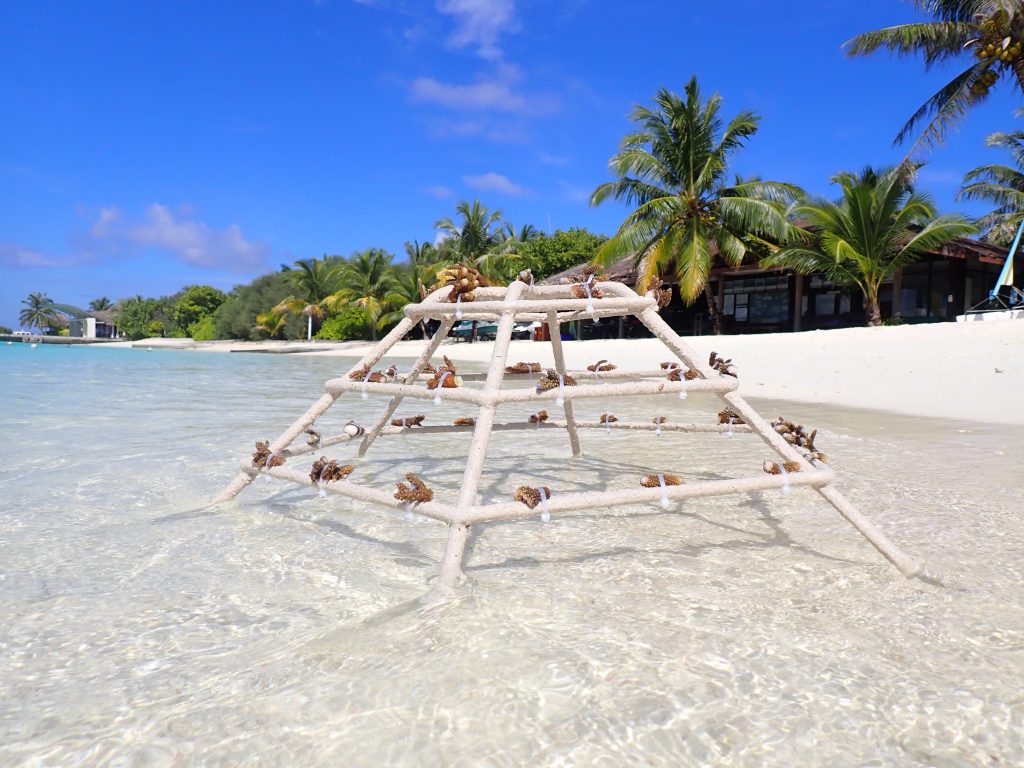
At the heart of the partnership lies the resort’s Adopt a Coral programme, part of the Good Travel with Marriott Bonvoy initiative, which encourages guests to travel with intention through meaningful environmental experiences. Through this hands-on activity, visitors can adopt and name a coral frame while learning directly from marine experts about coral ecology and the importance of protecting marine habitats.
To deepen this connection beyond the stay, guests receive growth updates on their adopted corals every six months, allowing them to follow the progress of their living contribution to the reef. As these corals grow over time, they become enduring symbols of renewal and shared responsibility, transforming a holiday memory into a lasting environmental legacy, and reflecting how travel can positively support local ecosystems and communities.
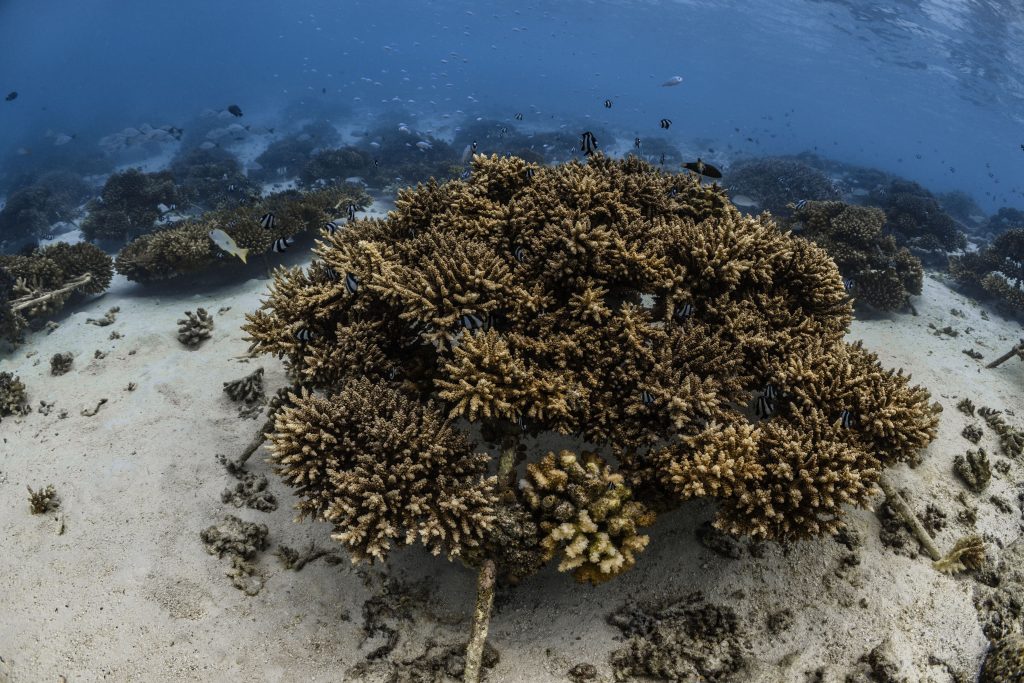
“Our island is surrounded by a remarkable marine environment, and protecting it is a responsibility we take seriously. Our partnership with Reefscapers reflects our belief that hospitality should go hand in hand with stewardship. Seeing the reef restoration progress over the past six years, and the involvement of our guests and associates in that journey, makes this anniversary especially meaningful for all of us,” comments Greg Allan, General Manager of Sheraton Maldives Full Moon Resort & Spa.
Through its continued collaboration with Reefscapers, Sheraton Maldives Full Moon Resort & Spa remains dedicated to advancing marine conservation while creating purposeful guest experiences rooted in sustainability, education, and connection to nature.
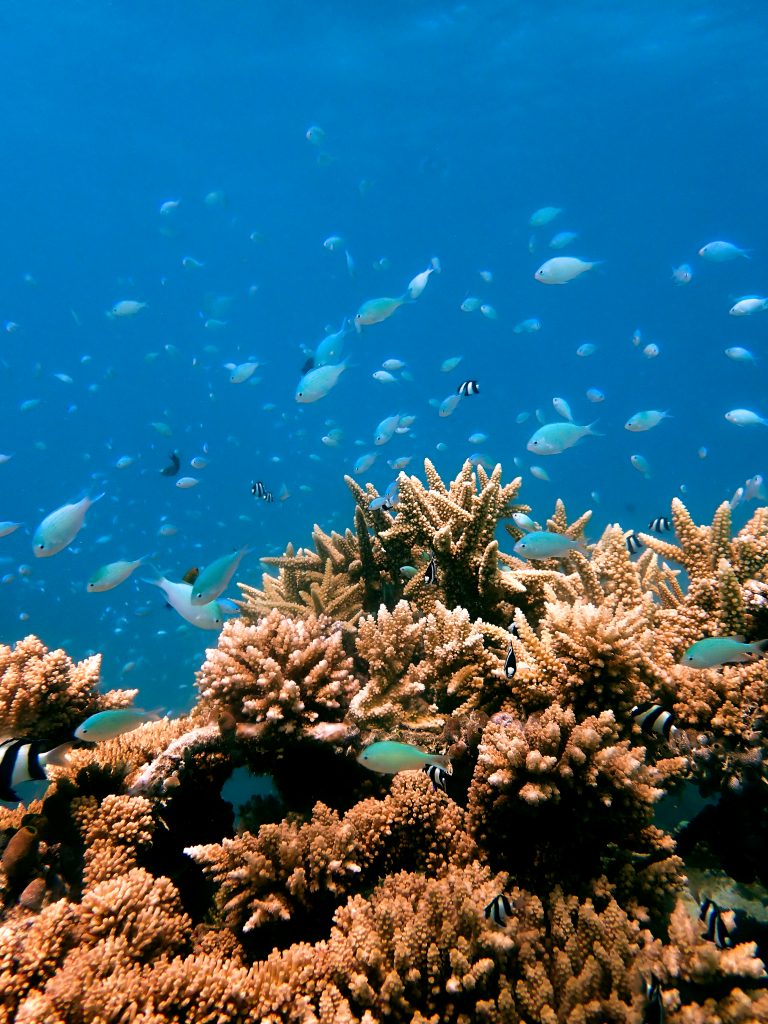
To discover more about the resort’s sustainability initiatives, join the Adopt a Coral programme, or plan a stay that supports reef conservation, visit sheratonmaldives.com or contact the reservations team at Sheraton.Maldives@sheraton.com.
Action
Sun Siyam Vilu Reef unveils expanded marine excursion portfolio

Sun Siyam Vilu Reef, part of the Sun Siyam Privé Collection, has introduced an expanded portfolio of water-based experiences designed to showcase the natural environment and marine life of the surrounding atolls. The enhanced programme combines exploration, activity and moments of calm, offering guests new ways to experience the Maldives through curated ocean journeys and personalised excursions.
Building on established activities such as Jet Car rides, SeaBob adventures and windsurfing, the resort has expanded its watersports offering to include private speedboat journeys and bespoke marine experiences. These additions are tailored for small groups seeking intimate and meaningful encounters with the ocean.
Available daily from the resort’s Watersports Centre, the new private speedboat excursions provide a personalised way to explore the hidden marine sites of Dhaalu Atoll. Designed for one to four guests, each journey offers flexibility and individual attention. Guests may choose from four-hour, five-hour or full-day itineraries, all of which include a freshly prepared barbecue lunch. From coral gardens to secluded sandbanks, the excursions highlight the region’s diverse marine landscapes.
The programme’s centrepiece is the Full Day Adventure Trip, which offers an extended exploration of key marine locations. Highlights include the Coral Garden, known for its biodiversity and reef formations; Turtle Point, where sea turtles are frequently sighted; and Nurse Shark Point, which provides opportunities to observe nurse sharks in their natural environment. The experience concludes with a beachside lunch on a private sandbank, set against uninterrupted views of the Indian Ocean.
For guests seeking a balance between activity and relaxation, the Waves of Adventure and Calmness experience combines a private two-hour snorkelling safari or Jet Ski safari with a full-body massage at the resort. The programme is designed to transition smoothly from ocean exploration to restorative island time, reflecting the relaxed pace that characterises Sun Siyam Vilu Reef.
As part of the Sun Siyam Privé Collection, Sun Siyam Vilu Reef continues to focus on personalised service and experiences rooted in the natural setting of the Maldives. Through its expanded watersports offering, the resort invites guests to engage with the marine environment while enjoying a sense of privacy, discovery and connection to the Maldivian seascape.
-
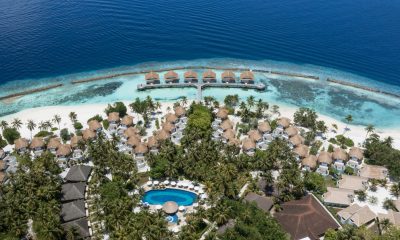
 Awards1 week ago
Awards1 week agoBandos Maldives earns Booking.com Traveller Review Award 2026
-
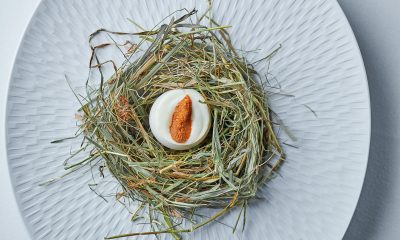
 Cooking1 week ago
Cooking1 week agoA spring of flavours: Nowruz dining series at JW Marriott Maldives Resort & Spa
-
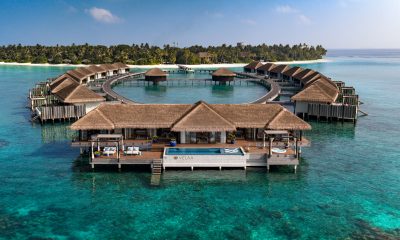
 News1 week ago
News1 week agoRefined overwater vision: Velaa Private Island’s upgraded Ocean Pool House
-
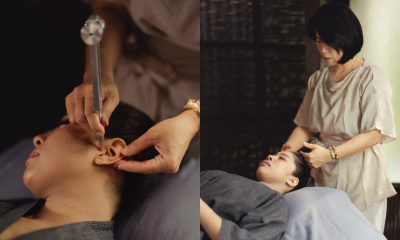
 Featured1 week ago
Featured1 week agoYoko Kawaguchi to lead holistic wellness residency at Vakkaru Maldives
-
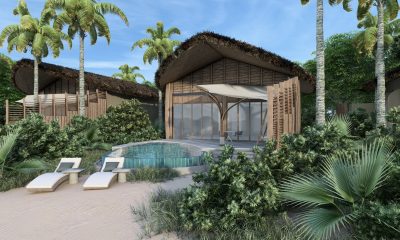
 News5 days ago
News5 days agoPulse Hotels & Resorts unveils Aura Maldives, a mindful luxury sanctuary
-
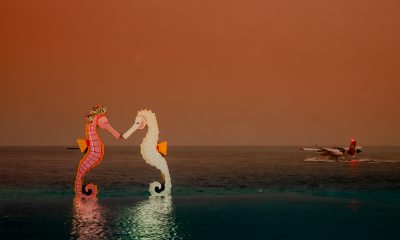
 Love1 week ago
Love1 week agoFushifaru Maldives combines romance and lunar new year traditions in guest programme
-
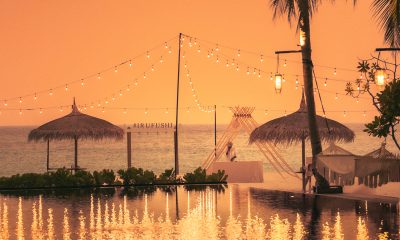
 News6 days ago
News6 days agoSun Siyam Iru Fushi sets new nenchmark with 24 Hour Premium All Inclusive Dine Around
-
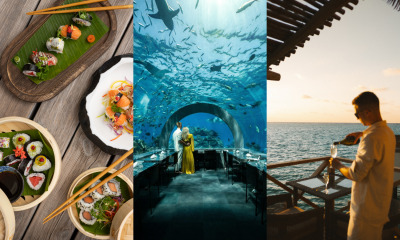
 Featured6 days ago
Featured6 days agoYou & Me Maldives unveils curated Premium All Inclusive programme












